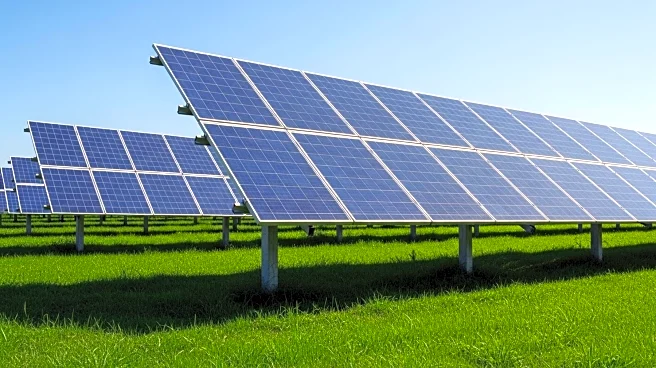What's Happening?
A report by SolarPower Europe and Fraunhofer ISE reveals that Europe could produce up to 30 gigawatts of solar manufacturing by 2030, provided there is adequate policy support. The study, titled 'Reshoring Solar Module Manufacturing to Europe,' outlines strategies to enhance domestic solar manufacturing and strengthen supply chain resilience against imports from China. Walburga Hemetsberger, CEO of SolarPower Europe, emphasized the need for urgent action from the EU and its Member States to prevent the loss of industrial and technological capabilities in solar manufacturing. The report highlights the cost differences between producing solar modules in Europe and China, driven by higher expenses in equipment, labor, and materials. Despite these costs, European-made modules are competitive under the Net-Zero Industry Act auction rules, suggesting that with the right support, Europe can achieve competitiveness in solar manufacturing.
Why It's Important?
The report underscores the significance of reshoring solar manufacturing to Europe, which could create thousands of local jobs and retain economic value within the region. Achieving the 30 GW target by 2030 would require substantial industry support, estimated between €1.4 billion and €5.2 billion annually. The potential macroeconomic benefits include the creation of 2,700 jobs and significant tax and social contributions. Establishing a competitive solar manufacturing sector in Europe is crucial for enhancing supply chain resilience, retaining economic value domestically, and contributing to the region's climate and energy transition goals. The report calls for EU-level output-based support schemes and the implementation of NZIA policy schemes across Member States to achieve these objectives.
What's Next?
The report recommends the establishment of an EU-level output-based support scheme for solar manufacturing, combining grants, loans, and de-risking instruments to cover both CAPEX and OPEX. It also suggests implementing NZIA policy schemes across Member States, including 'Made-in-EU' bonus points in rooftop support programs and public procurement initiatives. The Net-Zero Industry Act, adopted in June 2024, sets rules for Member States on incorporating non-price criteria in renewable energy auctions. Member States are required to implement these provisions from January 2026 onward. The success of reshoring clean technology manufacturing in Europe will depend on how effectively Member States apply the non-price criteria in their auctions.
Beyond the Headlines
The report highlights the broader implications of reshoring solar manufacturing in Europe, including enhancing supply chain resilience and contributing to the region's climate and energy transition goals. The Net-Zero Industry Act provides a historic opportunity for reshoring clean technology manufacturing, but its success will depend on effective implementation by Member States. The report suggests that with targeted policy support, Europe can build a competitive solar manufacturing sector, retain economic value domestically, and contribute significantly to the region's broader climate and energy transition goals.












